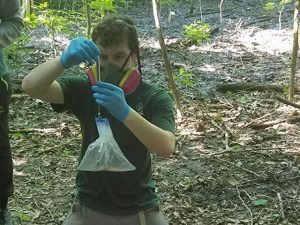 Can the introduction of a small animal predator curtail the spread of Lyme Disease in humans?
Can the introduction of a small animal predator curtail the spread of Lyme Disease in humans?
Honors College senior Jeremiah Eaton spent the summer in Cleveland, Ohio researching that question.
More than 200,000 people every year contract Lyme Disease in the United States. The tick-borne illness causes a rash and flu-like symptoms, and left untreated, can cause facial palsy and other more serious symptoms, according to the Centers for Disease Control and Prevention.
Eaton, a zoology major in the College of Natural Science, was part of a group of graduate and undergraduate researchers that trapped and then tagged the ears of small animals – mainly deer mice – scanning them for ticks in parts of the Cleveland Metroparks. The group set out a fox decoy and fox urine to study whether the introduction of a predator to the deer mice would have any effect on their movements.
“In theory, if these predators make the small animals move less, these animals are less likely to pick up ticks and infect them and then that will lower the risk of Lyme Disease in humans,” Eaton said.
The data collected by the group is part of the Research on the Ecology of Carnivores and their Prey (RECaP) Laboratory at Michigan State University. The lab, which operates under the direction of Associate Professor Robert Montgomery, studies predator-prey dynamics in urban settings, skin disease in giraffes, how wire snares affect the African Lion and more.
“I think the process of discovery is one of the best things, for me, personally,” Eaton said. “The lab itself is pretty diverse, which I really like.”
During the fall semester, Eaton took an independent study to learn the coding software used to analyze the data collected in the field.
He said while understanding research can be daunting at first, it is well worth the time to learn about it, especially as he prepares for graduate school.
Eaton credits the Hymen and Miriam Stein Scholarship he received through the Honors College for enabling him to participate in the summer research project in Cleveland, Ohio. The scholarship funds a student’s living and research expenses and provides funding during their senior year.
“I wouldn’t have been able to go down there if I didn’t get the scholarship,” he said.
Genevieve Gillette Fellowships Recipients: Mayank Jayaram and Joshua Zhao received the Genevieve Gillette Fellowships in 2018, which cover summer living expenses for students planning to produce a senior thesis or equivalent project. Jayaram studied breast cancer and Zhao studied speech patterns.
